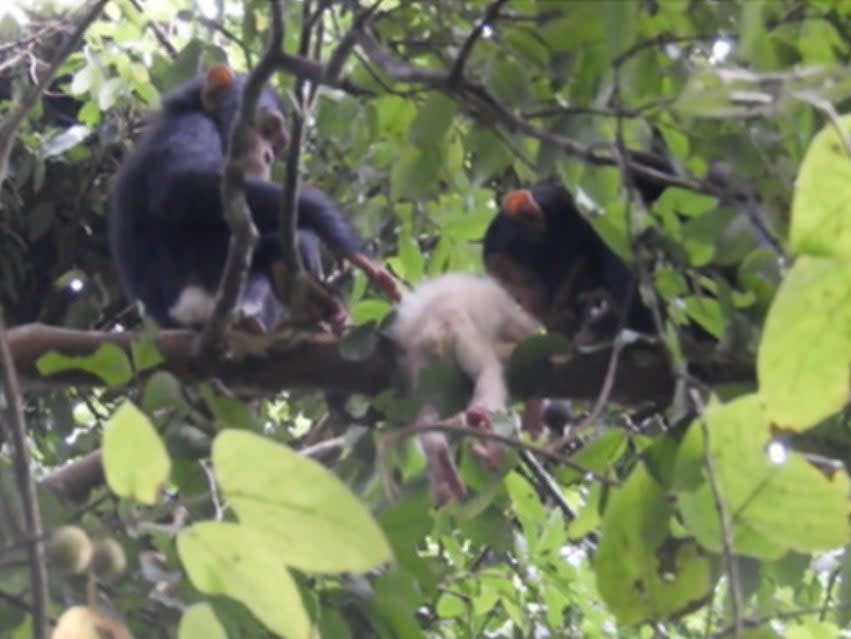Rare wild albino chimpanzee killed by other chimps

Chimpanzee researchers in Uganda have recorded the first known case of albinism in a wild population of the species, however, the young male was violently killed by other members of the group at just a few weeks old.
Despite the sad outcome, the researchers said the chimp, which had bright white fur, provided a valuable opportunity to document the behaviour of the chimpanzees.
The incident occurred in 2018 in the Sonso chimpanzee community in Budongo Forest Reserve, in western Uganda.
The researchers first spotted the albino chimp with its mother on 15 July, at which time they saw them being treated aggressively by an adult male.
On 17 July, they heard screams and “angry” shouts coming from a thicket where the alpha male from the group attacked and killed the infant along with other members of the group.
The cause of death was determined as a bite to the head by an adult female.
After the attack, the group of chimps abandoned the body, and the researchers carried out analysis on it to confirm the infant had a complete lack of pigment in its skin, hair and eyes, and had been around three weeks old at the time it was killed.

“The initial reaction of community members towards the infant appeared to be different from a typical situation in which chimpanzees encounter females with a newborn for the first time,” wrote the researchers, who were led by Maël Leroux of the University of Zurich.
“Even though some individuals responded calmly to the infant, most adult individuals seemed to react with fear upon encountering the newborn by keeping distance and producing alarm hoos and waa barks.”
The scientists said these two types of calls are associated with “risky, and potentially deadly situations, such as encountering snakes, bush pigs, or unfamiliar humans”.
Around three weeks after the albino chimp was born, the researchers witnessed an attack by the group’s alpha male, in which the infant was violently killed.
Infanticide among apes is not uncommon, and in this particular group of chimpanzees, it had been documented several times. But the researchers suggested that it was targeted due to its albinism.
They said: “The magnitude of the reaction some of the community members exhibited towards the infant with albinism makes it likely that the infant was not considered as a typical chimpanzee.
“The vigilant and even fearful behaviour including alarm calling by individuals upon the initial exposure to the infant seems to support this idea.”
After the infant died, numerous chimpanzees, both old and young were seen inspecting the corpse.
This “does not seem to be a typical behaviour that chimpanzees direct towards a dead infant”, the researchers said, adding, “the behaviour of the chimpanzees towards the corpse of the infant with albinism resembles that of chimpanzees when presented with a novel object.”
Only one other chimpanzee with albinism has previously been recorded, and though born in the wild, it was captured as a newborn and reared in captivity. As a result, researchers had not been able to see how wild populations of chimpanzees might respond to an individual with albinism.
The research is published in the American Journal of Primatology.
Read More
Climate crisis could kill 83 million people by 2100, study finds
Three Americans produce enough carbon emissions in a lifetime to kill one person, study finds
‘Deeds not words’: Climate campaigners renew call to action for ministers 100 days before Cop26

 Yahoo News
Yahoo News 
